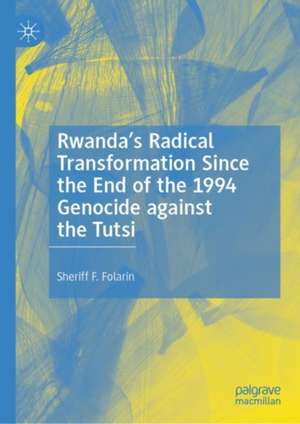Rwanda’s Radical Transformation Since the End of the 1994 Genocide against the Tutsi
Autor Sheriff F. Folarinen Limba Engleză Hardback – 8 aug 2023
Preț: 699.59 lei
Preț vechi: 823.05 lei
-15% Nou
Puncte Express: 1049
Preț estimativ în valută:
133.87€ • 145.87$ • 112.80£
133.87€ • 145.87$ • 112.80£
Carte tipărită la comandă
Livrare economică 23 aprilie-07 mai
Preluare comenzi: 021 569.72.76
Specificații
ISBN-13: 9783031370106
ISBN-10: 3031370104
Ilustrații: XXXI, 254 p. 91 illus., 90 illus. in color.
Dimensiuni: 148 x 210 mm
Greutate: 0.49 kg
Ediția:1st ed. 2023
Editura: Springer Nature Switzerland
Colecția Palgrave Macmillan
Locul publicării:Cham, Switzerland
ISBN-10: 3031370104
Ilustrații: XXXI, 254 p. 91 illus., 90 illus. in color.
Dimensiuni: 148 x 210 mm
Greutate: 0.49 kg
Ediția:1st ed. 2023
Editura: Springer Nature Switzerland
Colecția Palgrave Macmillan
Locul publicării:Cham, Switzerland
Cuprins
Chapter 1: Introduction.- Chapter 2: A Factsheet of Rwanda.- Chapter 3: It’s Getting Bloody: From Early Signposts to the Searing Images of Genocide.- Chapter 4: Empathy, Love for Rwanda and Personal Quest.- Chapter 5: Tragedy to Triumph: Leadership, Military, People and Reconstruction.- Chapter 6: Forgiveness, Resilience, Exploits and Challenges.- Chapter 7: Radical Transformation, National Security Symposiums and Future of Rwanda.- Chapter 8: It’s Not Goodbyes but See You Again: The Allures of Rwanda.- Chapter 9: A Pictorial Excursion on Rwanda’s Transformation.- Chapter 10: Conclusions.
Notă biografică
Sheriff F. Folarin is a Professor of International Relations and visiting scholar at the Department of Political Science, Texas State University, USA; and at the Center for Conflict Management, University of Rwanda, Rwanda.
Textul de pe ultima copertă
This book discusses the radical transformation of Rwanda, focusing on the dynamics of its society before and after the genocide against the Tutsis in 1994. Through contextualizing the significant changes experienced by the country, it throws searchlights on a number of other African states facing similar challenges. The author analyses Rwanda's challenges of nationhood after the genocide; the vision and will of the country’s leadership; its social programs and strategies for cohesion and national development; the population’s resilience; and its growing regional influence in the twenty-first century. Rwandan society is here considered not only through the lens of existing literature on African politics, but also through direct engagement and fieldwork with local populations, scholars and policymakers. In addition, the book weighs in on narratives of survivors and victims of the genocide to understand and present local dispositions to current realities such as reforms, development plans, inclusive policies and programs, and determine how Rwandans deal with historical identity issues and conflicts. This book will be of interest to students, scholars and researchers interested in Rwandan and African politics, peace and conflict studies, security (strategic) studies, and genocide studies.
Sheriff F. Folarin is a Professor of International Relations and visiting scholar at the Department of Political Science, Texas State University, USA; and at the Center for Conflict Management, University of Rwanda, Rwanda.
Caracteristici
Discusses the radical transformation of Rwanda, focusing on the dynamics of its society Throws searchlights on a number of other African states facing similar challenges Weighs in on narratives of survivors and victims of the genocide to understand and present local dispositions
